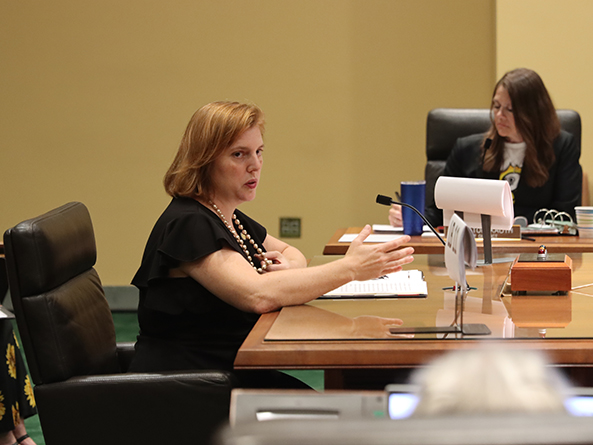Cigarette tax increase proposed
An increase in cigarette taxes would be used to fund property tax relief and Medicaid waiver services under a bill heard by the Revenue Committee July 29.

LB11, introduced by Omaha Sen. Machaela Cavanaugh, would raise the tax on a pack of 20 cigarettes from 64 cents to $2.14 beginning Oct. 1, 2024. Revenue from the increase would be divided between the Property Tax Credit Cash Fund, which would receive $1 per pack, and a newly created Medicaid Waiver Cash Fund, which would receive 50 cents.
The Medicaid Waiver Cash Fund would be administered by the state Department of Health and Human Services and would be used to pay the state’s portion of the cost for services provided through Medicaid waivers.
Cavanaugh said studies show that a $1.50 per pack increase is sufficient to impact smoking rates and that the proposal would result in Nebraska having only the 17th highest cigarette tax nationally.
She said the bill is estimated to generate $53 million annually for property tax relief and $26 million for the Medicaid waiver fund in its first few years.
“If we’re going to be discussing tax increases and tax cuts, this is an important one that we should be considering,” Cavanaugh said.
Megan Word, government relations director for the American Cancer Society Cancer Action Network, testified in favor of the proposal. Nebraska has not increased taxes on cigarettes in 22 years, she said.
Twenty-eight percent of cancer deaths in Nebraska can be attributed to smoking, Word said, and a price increase would cause more adults to quit and fewer young people to start.
Edison McDonald, executive director of the Arc of Nebraska, also supported the proposal. He said LB11 could generate important funding for Medicaid waivers that provide assistance to Nebraskans with developmental disabilities.
“We want to make sure that people with disabilities have access to services and this is a fantastic opportunity to make sure that we can do so without cutting services to other individuals,” McDonald said.
Testifying in opposition, Nicole Fox of the Platte Institute said cigarette taxes are not a stable source of revenue. Such taxes also are regressive, she said, and impact lower-income adults and those with disabilities the most due to their higher rates of smoking.
In addition, Fox said, the tax increase outlined in the bill would result in a pack of cigarettes costing almost $10 on average in Nebraska. That price would provide a “significant incentive” for smokers to cross to a border state to purchase cigarettes, she said.
Ansley Fellers, representing the Nebraska Grocery Industry Association, agreed. Also testifying in opposition, she said LB11 would result in a tax increase of more than 200% per pack, making cigarettes more expensive in Nebraska than all neighboring states except Colorado.
“More than 50% of Nebraskans live within 50 miles of the state line, making it relatively simple to go to surrounding states for cheaper goods,” Fellers said.
The committee took no immediate action on the proposal.


